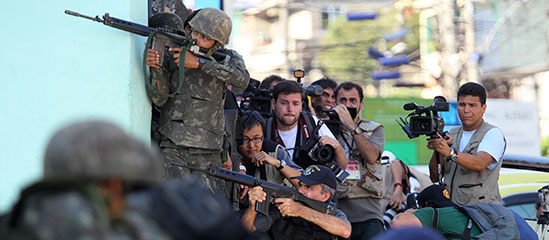Sidebar: Freedom of the press is still a work in progress
By Fernando Rodrigues
The street protests in Brazil in June 2013 received extensive news coverage. However, for the first time in years, attacks against journalists and media organizations also became a frequent topic in the press.

Formal censorship in Brazil ended with the transition to civilian rule in 1985, after 21 years of military dictatorship. Under democracy, journalists have still suffered attacks, but this has never been a topic of sustained media attention. This lack of interest is intriguing to observers abroad. It is as if the perception does not exist in Brazil that the job of reporters in the country is often dangerous.
HALFTIME FOR THE
BRAZILIAN PRESS
• Table of Contents
In print
• Download the pdf
In other languages
• Português
This may have something to do with the fact that Brazil, historically, has experienced very uneven development among its many regions. While in some of those regions individual and collective rights are protected, others lag far behind.
In large capitals and metropolitan areas, respect for media organizations, journalists, and freedom of expression is stronger. In more remote areas of the interior, that is not always the case. Brazil has about 5,500 municipalities, half of them very small. In these towns, it is common for the political leader in power to also own the major media channels.
When crimes against journalists are committed in the interior, there are two common reactions, and they are not always mutually exclusive. One, attacks against reporters are condemned. Two, doubts are aired whether the attack was intended to silence freedom of expression or whether it was political and partisan in nature, because the media outlet and/or the journalist were directly related to a political party.
It is clear that attacks on freedom of expression should always be condemned, regardless of whether the owner of the newspaper, TV or radio station, or website is a politician or not. But this overlap of interests—political and journalistic—has undermined the rights of journalists to exercise their profession freely.
Then came the events of June 2013. The protests resulted in attacks against reporters in Brazil’s major capital cities. Many of the journalists assaulted worked for media companies considered independent. What is more, the assaults were perpetrated both by protesters and security forces. A debate quickly ensued whether Brazil should take measures to ensure safe working conditions for reporters.
The Brazilian Association of Investigative Journalism (ABRAJI) studied the attacks against media workers and counted 163 episodes from May 2013 to March 2014. Most violent incidents occurred in large urban centers. There was an increase in the coverage of these attacks. Media organizations, journalists, and government agencies mobilized to seek ways to help ensure the safety of reporters.
Since it was founded, ABRAJI has offered seminars and workshops to train journalists working in zones of conflict. The Brazilian government has also begun to act, and on March 28 and 29, 2014, the Brazilian Ministry of Justice held a workshop to help train media workers to cover street protests.
Brazil is a young democracy. Certain republican values have not yet been fully consolidated. Only now, 50 years after the 1964 coup d’état, has the number of Brazilians who support democracy risen above the 60 percent mark. Freedom of the press and safe conditions for media workers are still new in many regions. The protests of June 2013 showed that these rights can also be fragile in Brazil’s major cities. The fact that this debate is now becoming more widespread is a good sign. The country is moving in the right direction, but the journey will be a long one.
Fernando Rodrigues is a journalist, founder of ABRAJI and a member of the Board of Trustees of the Fund to Support Investigative Journalism (F/ABRAJI). He works for the Folha de São Paulo newspaper and the UOL news portal.